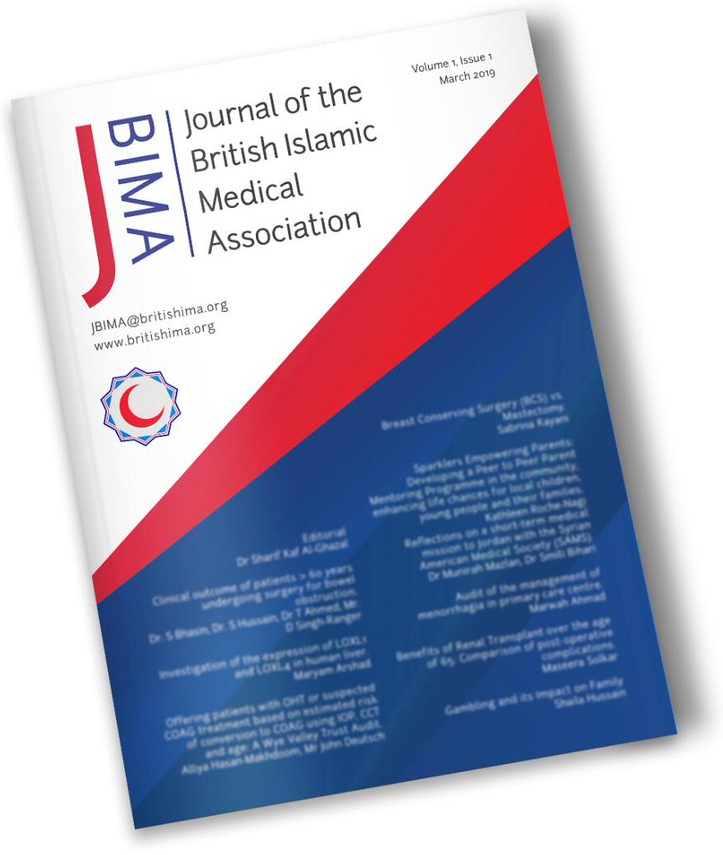
Assalamo Alaikom,
It has been a long time coming but after months of preparation, we’re delighted to announce we’re finally here. Welcome to the inaugural edition of the long-awaited Journal of the British Islamic Medical Association (JBIMA), the first Islamic medical journal of its kind in the UK. We will be publishing three times a year inshaAllah and it is an exciting time to be involved in JBIMA. Since my election as current president of the British Islamic Medical Association (BIMA) in December 2017, we have been working towards the creation of this project and I am proud that due to the momentous joint-effort of the team at BIMA, JBIMA is a reality.
We are looking to fill a real gap in the UK academic community. There are plenty of academic journals in circulation but none in the UK which put the relationship between Islam and health at the very heart of their existence. Conferences, seminars and webinars aren’t alone to satiate BIMA’s growing membership’s hunger for medical education, a journal will go some way in addressing this.
The remit of JBIMA is broad; we aim to cover a wide variety of topics including but not limited to Islamic medical ethics, the history of Islamic medicine, health advocacy and various Muslim public health issues.
One thousand years ago, Islamic medicine was the most advanced in the world at the time. Even after ten centuries, the achievements of Islamic medicine look amazingly modern. At that time, the Muslims were the great torchbearers of international scientific research. Every student and professional from each country outside the Islamic world, aspired, yearned, and dreamed to go to the Islamic universities to learn, work, live and lead a comfortable life in an affluent and most advanced and civilized society. The Bimaristans of the time (hospitals of the Islamic world) were large and well renowned for their advancements in medicine at the time. Golden era medical practitioners such as Ibn Sina, Al-Zahrawi, Ibn Al-Nafis and others became greatly influential to modern medicine. The impact of their work was a contributor to the Renaissance, though this is still not as well-known as it should be amongst non-Muslim audiences. We aim to share this knowledge and instil this into our psyche.
Rapid advancements in the innovation of medical technology have given rise to the critical need for expansion of the bioethical field to keep up with medical practice and research while relating the ethical decisions to their religious sources and reliable medical knowledge. Muslim bioethicists are doing their utmost to keep pace with and produce answers to the questions posed by the medical establishment. The questions brought up by various topics including abortion, assisted reproductive technology, cloning, organ donation, end of life care and euthanasia are difficult and need to be discussed and debated. The physician–patient relationship, ethical questions regarding consent, confidentiality, as well as the regulation of the Medical Profession and Medical Research are important topics within the professional sphere and should also be explored. JBIMA will provide a platform to facilitate discussion on these topics and help stimulate academic scholarship.
The relationship between Islam and health is one that has not been adequately explored within the UK academic community; focusing on health guidelines contained in prophetic texts (al tib al-nabawi) and in Islamic teachings is a worthwhile endeavour. The noble Quran and Sunnah reflect this and offer guidance on health, physical and mental wellbeing too.
Moreover, JBIMA aims to provide a space to discuss issues concerning the challenges Muslim healthcare professionals face in their workplace which are multifaceted and complex. The diversity of opinion and background of membership within BIMA provides an opportunity for these discussions to take place. These workplace challenges are manifold but include issues such as dress code restrictions for Muslim female healthcare professionals and equality and diversity initiatives in their workplace.
The journal will also provide a platform to publish various opinion articles, letters to the editor, book reviews and other pieces of interest that are relevant to our readers. We hope that the space that JBIMA offers to discuss issues pertinent to our membership keeps them engaged nationally and even appeals to those reading it internationally.
BIMA’s mission statement is to Unite, Inspire and Serve. We at JBIMA would like to contribute to the achievement of the goals of this mission statement through our work over the coming months and years. We hope that this journal and its sharing of knowledge can unite and bring the Muslim healthcare community closer together. We hope that the information gleaned by its readers inspires and motivates them to even greater heights. We hope that what is published within the journal benefits those reading it.
And with the dedication of the BIMA family, there is no reason why through the efforts of JBIMA, we cannot make the above a reality. As BIMA has grown from strength to strength since its founding in 2013 until now, we are confident that JBIMA will experience similar success and act as an outlet to ensuring BIMA’s mission statement is a reality.
We would like to invite further contributions for upcoming editions. We strive to have a real diversity of expertise and opinion; one that truly reflects the diversity within Muslim healthcare professionals in the UK today. Medical students, Junior doctors other healthcare professionals, and those with an interest in the aforementioned topics, we are happy to publish your work too. The team at JBIMA are more than happy to receive your feedback and suggestions in order to continuously improve our journal and we look forward to hearing from you as we develop.
Wassalamo Alaikom
Yours truly,
Dr Sharif Kaf Al-Ghazal
Editor in Chief

